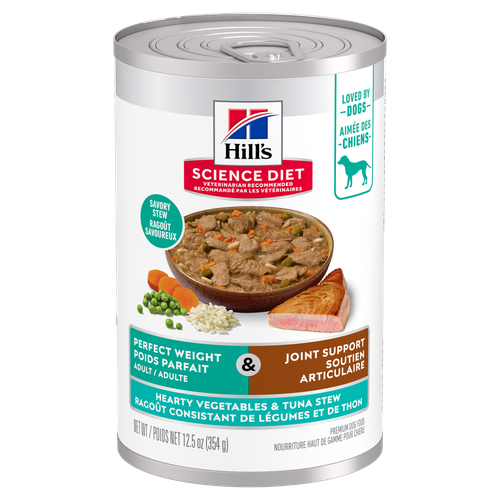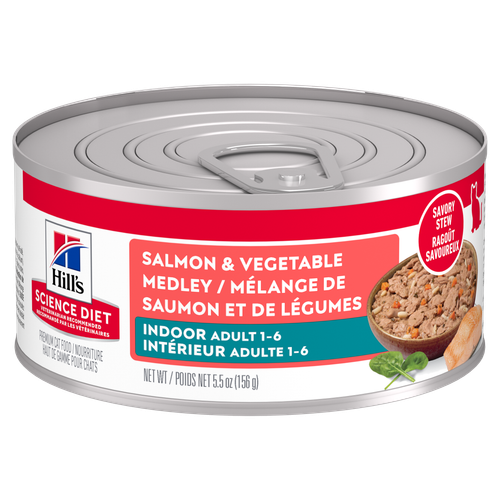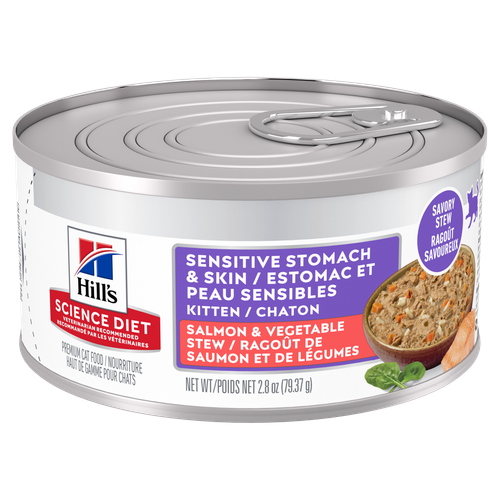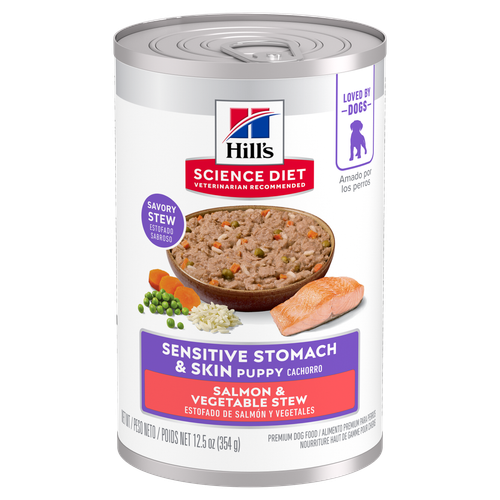
-
Find the right food for your petTake this quiz to see which food may be the best for your furry friend.Find the right food for your petTake this quiz to see which food may be the best for your furry friend.Featured products
 Healthy Cuisine, Adulte, assortiment de conserves
Healthy Cuisine, Adulte, assortiment de conservesHill's Science Diet Healthy Cuisine Variety Pack
Shop Now Sensitive Stomach & Skin, assortiment de conserves
Sensitive Stomach & Skin, assortiment de conservesHill's Science Diet Sensitive Stomach & Skin Variety Pack
Shop Now Adult Perfect Weight & Joint Support Hearty Vegetables and Tuna Stew Dog FoodShop NowFeatured products
Adult Perfect Weight & Joint Support Hearty Vegetables and Tuna Stew Dog FoodShop NowFeatured products Adult Urinary Hairball Control Savory Chicken Entrée cat food
Adult Urinary Hairball Control Savory Chicken Entrée cat foodSupports the health of the whole urinary system with optimal levels of magnesium
Shop Now Adult Indoor Salmon & Vegetable Medley Cat Food
Adult Indoor Salmon & Vegetable Medley Cat FoodPrecisely balanced nutrition for indoor cats with the delicious taste of savory salmon and vegetables
Shop Now Kitten Sensitive Stomach & Skin Salmon & Vegetable Stew
Kitten Sensitive Stomach & Skin Salmon & Vegetable StewSupports kitten growth, digestive health, nourishes skin and promotes a lustrous fur
Shop Now -
Dog
- Dog Tips & Articles
-
Health Category
- Weight
- Food & Environmental Sensitivities
- Urinary
- Digestive
- Joint
- Kidney
- Dental
- Cancer
-
Life Stage
- Puppy Nutrition
- Adult Nutrition
- Senior Nutrition
Cat- Cat Tips & Articles
-
Health Category
- Weight
- Skin & Food Sensitivities
- Urinary
- Digestive
- Kidney
- Dental
- Stress
- Cancer
-
Life Stage
- Kitten Nutrition
- Adult Nutrition
Featured articles Compare Your Pet Food's Calories to Other Brands
Compare Your Pet Food's Calories to Other BrandsCompare Hill's Science Diet dog and cat food's calories against other pet food brands and AAFCO recommended maximum calorie count.
Read More The Incredible Science Behind Your Pet's Microbiome
The Incredible Science Behind Your Pet's MicrobiomeLearn what a pet's microbiome is, how it contributes to your pet's gut & overall health, and why nutrition is important in maintaining healthy microbiomes.
Read More Pet Food Storage Tips
Pet Food Storage TipsDiscover how and where to store your dry, as well as canned, dog and cat food. Learn how to find the "best before" dates on all Hill's pet food packaging.
Read More -


Understanding free radicals can help you choose the right cat food and provide the best care for your pet. Free radicals are a by-product of energy production within the body. A dog or cat's body can normally handle free radicals, but if the amount of free radicals becomes excessive or if sufficient antioxidants are not available to help, these free radicals could have detrimental effects on your pet's health.

What are free radicals? Free radicals are highly reactive, oxygen-containing molecules that can damage cell membranes, enzymes and even DNA. Your pet's nervous and immune systems are especially vulnerable. Free radicals are now considered a factor in the progression of disease and premature aging in dogs and cats.
What are antioxidants? Antioxidants (like the name anti-oxident-) neutralize these reactive oxygen containing molecules. Antioxidants for your dogs and cats are nutrients within food that help protect the body from damage caused by free radicals. They are key when it comes to keeping your pet healhty. Common antioxidants include vitamins C and E. An abundance of antioxidants of different types are found in colorful fruits and vegetables. The right combination of antioxidants in cat or dog food can help make a difference in health.
How antioxidants help. The body's normal antioxidant defenses provide some protection against free radicals Dog and cat food rich in antioxidants, including vitamins E and C, beta-carotene and selenium, provide support for your dog or cat's natural defenses.


Tasty Tips
Young pets may need several visits in their first year for vaccinations. Adult pets generally benefit from annual check-ups, while senior or special-needs pets might require more frequent visits.
Most effective in combinations. The best antioxidant dog or cat food combines specific levels of key antioxidant vitamins E+C, selenium and beta-carotene to help support the immune system and help cells fight free radicals. A nutrionally complete and balanced food will have the best antioxidants for dogs and cats at optimal levels.
How Hill's® cat foods make a difference. The unique combination of antioxidants in Hill's clinically proven antioxidant formula can significantly reduce cellular oxidation by free radicals.1
If you're inclined to give your dogantioxidant supplements, another option is to find a Hill's food to help your dog ahieve optimal antioxidant levels to support health. Antioxidants are not just for dogs. Cats need them too. Foods with antioxidants support a healthy immune system, fight free radicals and maintain overall health for your cat.
¹Jewell DE, Friesen, K., Larson, L., Sharp, T., and Schultz R. Journal of Animal Science 2003. (81 Suppl 1) 261.
Vitamin E Helps neutralize free radicals that cause damage.
Vitamin C In-activates free radicals. Regenerates vitamin E, restoring its antioxidant activity.
Selenium An essential component of beneficial antioxidant enzymes.
Beta-carotene Scavenges free radicals and works together with vitamin E.


One of our staff authors prepared this article for you
Related products

Hill's Science Diet Sensitive Stomach & Skin Variety Pack

Gentle on stomachs while nourishing skin & supporting development in growing puppies

Hill's Science Diet Healthy Cuisine Variety Pack

Related articles

Learn what a pet's microbiome is, how it contributes to your pet's gut & overall health, and why nutrition is important in maintaining healthy microbiomes.

Compare Hill's Science Diet dog and cat food's calories against other pet food brands and AAFCO recommended maximum calorie count.

Learn why nutrients like antioxidants & amino acids can help improve your pet's immune system, as well as top antioxidants to look for in pet food.

Discover how and where to store your dry, as well as canned, dog and cat food. Learn how to find the "best before" dates on all Hill's pet food packaging.

Put your pet on a diet without them knowing
Our low calorie formula helps you control your pet's weight. It's packed with high-quality protein for building lean muscles, and made with purposeful ingredients for a flavorful, nutritious meal. Clinically proven antioxidants, Vitamin C+E, help promote a healthy immune system.
Put your pet on a diet without them knowing
Our low calorie formula helps you control your pet's weight. It's packed with high-quality protein for building lean muscles, and made with purposeful ingredients for a flavorful, nutritious meal. Clinically proven antioxidants, Vitamin C+E, help promote a healthy immune system.

